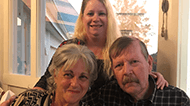Mary Kass – Cervical Cancer Patient Story

In 2011, Mary Kass noticed spotting and felt bloated. The 56-year-old alerted her gynecologist, who after seeing Mary in her office, immediately referred her to a UPMC Magee-Womens gynecologic oncologist at UPMC Mercy.
“When she said my appointment was the next day, that’s when I understood that this wasn’t good,” says Mary. “My gynecologic oncologist examined me and told me I had cancer. It was devastating.”
The doctor recommended Mary see his colleague and gynecologic oncologist Alexander Olawaiye, MD. Mary’s appointment was just two days later at UPMC Magee-Womens Hospital – not far from her home in Munhall.
Comprehensive Gynecologic Cancer Care
After meeting with Dr. Olawaiye and his team, Mary learned she had stage four cervical cancer and needed to start radiation treatment right away. The only challenge was that Mary worked full-time as a seamstress in the costume shops of the Pittsburgh Public Theater, Pittsburgh CLO, and the Pittsburgh Opera.
“I still had two more weeks of working on a big and complicated show,” says Mary. “But Dr. Olawaiye said I needed to start treatment now and that he was going to save my life.”
Mary immediately started low-dose chemotherapy and high-dose-rate radiation therapy. Her husband took her to every appointment – five days per week. It became her new “job.”
“I told myself I was going to win over the cancer,” says Mary. “I was starting to feel better, and the bleeding and cramping stopped.”
A scan in 2012 came back with good results, but Mary says Dr. Olawaiye was suspicious. By the end of the year, she was bleeding heavily, causing her to faint. Mary again saw Dr. Olawaiye and underwent a biopsy.
State-of-the-Art Treatments
Dr. Olawaiye recommended a surgical procedure called a total pelvic exenteration to remove Mary’s lower colon, rectum, bladder, cervix, vagina, ovaries, and nearby lymph nodes. He explained the surgery, which typically has a five-year survival rate of 50%, with her over the phone and in-person. Mary was also matched up with a survivor who had the same treatment.
“I talked to Juanita Torres about the procedure. She was so helpful in giving me tips, and she even visited me at the hospital,” says Mary. “Through the mentorship program, I was also able to help other people.”
Her surgery took place January 2013. She returned home the next month, followed by rehabilitation where she learned how to use her new urostomy and colostomy bags.
Mary then made it her mission to return to work, which she finally did later that year. Life was back to normal for her and her family; they were able to travel again.
Yet, in 2016, a scan showed the cancer was back – and it was growing – infringing on her bowel. This caused bleeding and the need for her to get blood transfusions.
Mary underwent chemotherapy again, but it wasn’t working. She developed a blood clot from her belly button to her ankle. Mary landed in the hospital in 2017 with neutropenia, which meant her white blood cells had decreased.
“I told Dr. Olawaiye ‘I still have a lot of fight in me. Don’t give up on me.’”
Innovative Immunotherapy
The next day, Dr. Olawaiye told her about a new immunotherapy drug, nivolumab. It wasn’t yet FDA-approved, so Dr. Olawaiye needed a grant to secure it.
In five weeks, Mary started using the medication. The swelling in her leg decreased, and her cancer went back into remission.
“Every day, there are new cancer treatments. That’s what kept me going,” says Mary.
After about three years of clean scans, Mary had a recurrence. She was given the drug ipilimumab to be used in combination with nivolumab.
In 2022, she was able to stop taking the medications. One year later, her scan in October 2023 was clear. Looking back, Mary appreciates the top-notch care and support she received.
“Dr. Olawaiye, the chemo nurse – everyone – enveloped me in their arms when I was diagnosed, and said they were going to get me through it,” adds Mary. “They held me up and let me know I would be OK. They couldn’t have been more supportive. I couldn’t have asked for better treatment. They carried me through.”
Support from family and friends, as well as her faith and positive outlook, were also instrumental.
“I always tried to have a good attitude. But, it’s more than just positive thinking,” says Mary. “There were so many ups and downs. It was my faith in God, my family, and friends who supported me and helped me get through.”
It’s now been 12 years since Mary was diagnosed with cancer, and she reports she’s feeling great and living life to the fullest.
“I’m enjoying the time I have now,” she says. “My husband and I started crossing things off our bucket list. In the past year, we traveled to Alaska twice and we are planning to go to Scotland in 2024. There is so much more that I can see and do now because I have this time.”
 UPMC
UPMC
 UPMC Children's Hospital of Pittsburgh
UPMC Children's Hospital of Pittsburgh
 UPMC Magee-Womens Hospital
UPMC Magee-Womens Hospital
 UPMC Immune Transplant and Therapy Center
UPMC Immune Transplant and Therapy Center

